[Infographic] 15 Things You Should Know Before Blogging in 2023
Blogging in 2023 is a different world than blogging in the past. The internet has changed a lot since the far-off history of 2011, the start of the modern blogging era. Blogging is more important than ever, and it's worth it to know just how important it is before you start your own. That's why I compiled this graphic and this article; to show you just how intense the world of blogging has become.

Copy code to embed this on your blog:
 30 Second Summary
30 Second Summary
You'll find that over 80% of web users read blogs regularly, with 70% viewing them as a sign of credibility. Currently, WordPress users create 70 million new posts monthly making it important to stand out. Longer posts over 1,200 words get better results - they bring in 900% more leads than shorter content. When you add images to your posts, you'll get 94% more visitors. If you focus on blogging, you're 13 times more likely to see a positive return on your investment.
Fact #1: WordPress users produce 70 million new posts and 77 million new comments every month.
WordPress is the world's most-used blogging platform, with blogs in over 120 languages. Though the vast majority of them are in English, the global population is familiar with WordPress and its role in blogging. WordPress themselves maintains this statistic.
WordPress users publish, on average, 70 million new posts every month. That's 840,000,000 new blog posts published every single year, just on WordPress. Factor in other blogging platforms, ranging from Facebook and LinkedIn to Tumblr and Blogger, and it's no wonder the internet is an endless sea of constantly updated, fresh content.
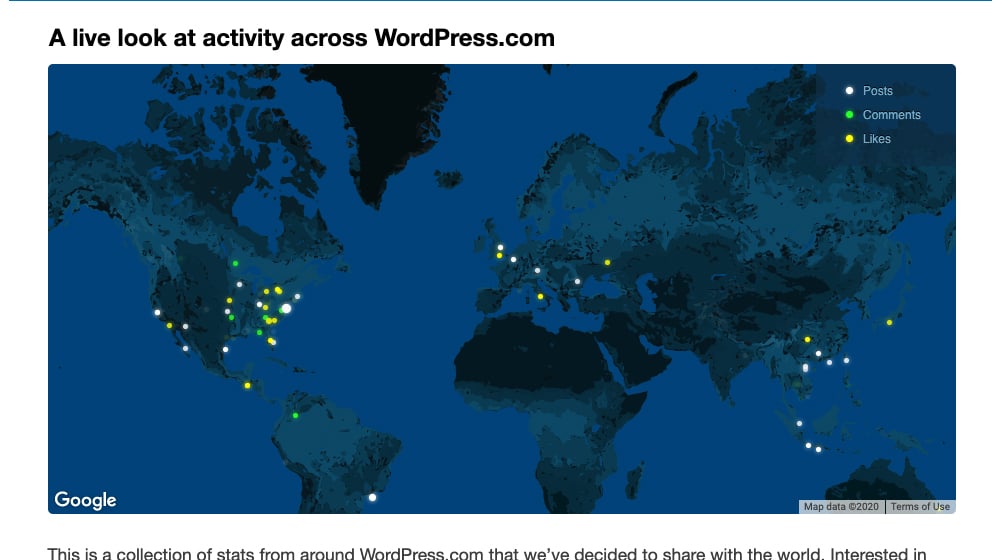
This is an important fact to know when you're blogging. With that many posts published every hour of every day, the vast majority of them get very little attention. There are millions of blogs out there with under double-digit readerships. To succeed in blogging, you need to be better than at least most of those out there. Much has been written about being among the best, ironically adding to the pile. Are you prepared to swim to the top of this ocean of content and make yourself visible?
Fact #2: About 350 new blog posts were just published since you read that last fact.
In case you needed an illustration of just how much content is being published at any given moment. It's a lot.
WordPress posts alone account for a ton of new content, and that doesn't even consider social media posts, blog comments, or other forms of content. Imagine if you added in everything new that was uploaded to Imgur, YouTube, Reddit, and Facebook!
Fact #3: The most common word count for new blog posts, by the start of 2020, was 1,231 – 1,351.
A huge part of modern blogging quality is centered around word count. Content that is very short tends to be viewed as "thin" content, by Google, by readers, and by algorithms that are designed to make sense of the unending morass of content published every day. Thin content is difficult to rank, so people write it less and less. Meanwhile, longer content is harder to write than shorter content, because you can't just fluff it up and let it go. You have to have a correspondingly higher amount of basic skeleton to build off of to achieve higher word counts.
The most popular word count ranges were 991 – 1,111, 1,112 – 1,230, and 1,231 – 1,351. All of these are close enough in numbers as to be almost identical, making up a huge bulk of the content published online. Content a little lower and a little higher than these ranges is also popular, with significantly shorter content dropping off dramatically, and significantly longer content dropping off more slowly.
What can you take away from this fact?
First of all, shorter content isn't worth it. Anything under about 650 words is generally considered too short to be valuable, unless you have specific circumstances that make it more valuable. For example, an FAQ page where each answer is its own URL can qualify as short but valuable content, though I still recommend merging the entire FAQ into one page. Likewise, a tutorial that doesn't need very many words to explain the entire process can be fine as a shorter piece.
Incidentally, this is why so many recipe blogs these days have a few hundred words before and after the recipe, telling a story about the item you're going to cook. That longer content ranks better and is more attractive to more people, where a recipe – that tops out at a few hundred words, tops – won't get that visibility.
Meanwhile, longer content can be great, but is not as popular to write. I can tell you why from personal experience: longer content is hard! It might take you an hour or two to write a 2,000-word piece on a topic you're familiar with. Bumping that up to 3,000 words can take 3-4 times as long. Trying to write a 10,000-word eBook is often a matter of weeks or months of dedicated research, outlining, writing, editing, and refining.
If you want to read more about the distribution of word counts, as well as the soruce of the data, you can read my breakdown here.
Fact #4: People read over 21.1 billion articles every month on WordPress alone.
Again, using WordPress as the foundation for this piece of data, because they're the biggest platform available with data they like to publish. There are a few things you can get out of this piece of data.
First of all, it shows you that the people reading blogs still vastly outnumber the people publishing them. Only 70 million posts are published, but 21 billion are consumed. That little b instead of m is important. It might not seem like blogging is very popular as a form of media these days, what with podcasts and YouTube videos and TikToks eating up everyone's attention, but they're still an immensely popular form of content.
If you printed off all of the blog posts viewed by people on a monthly basis, and stacked up those sheets of paper, you'd have created an ecological catastrophe and likely doomed the planet. If you somehow didn't, you'd have a tower over 3,277 miles tall. That's roughly 1/80th of the way to the moon! Okay, that might not necessarily seem like a lot, but that just goes to show you how incredibly far away celestial bodies are.
A more apt comparison would be the earth itself. If you were to dig straight down towards the center of the earth, deep enough to bury the entire stack of paper flush with the surface, you'd only have to dig another 700 or so miles before you hit the center of the planet.
Needless to say, people consume an absolute ton of content online even today. Adding together all of the time spent reading blog posts, reading social media posts, watching videos, consuming image-based content, and generally absorbing content online, and you have, well, the combined life experiences of seven billion people, wouldn't you say?
Fact #5: 80% of web users regularly read blog posts.
Content is king, but content is only king because of consumption. People still read blogs. Eight out of every ten people regularly read blogs, and those remaining two people still read them occasionally. It's hard not to, when blogging is the primary way content is distributed online today.
Fact #6: 70% of consumers think a blog adds credibility.
Why would you want to blog? If you have to compete against millions of blog posts published each month, and you're not absolutely sure of yourself and your content, it's easy to feel like it's a losing battle. Well, there are a few good reasons.
If you're running a website, a blog is almost required to be seen. A website with only a small handful of pages has a virtually zero percent chance of being visible on Google for anything other than direct brand name searches. Every additional page of content you publish is a potential vector for people to find you through their everyday Google, Yahoo, Bing, DuckDuckGo, or whatever other search engine usage.
More importantly, content gives your website credibility. People who encounter your website want to know who you are and why they should care about your business. If you're comparing two services, who would you trust? The one who says he's an expert, believe him, or the one who has a shelf full of books they wrote on the subject, free to check out as you desire?

Those 70% of people are not alone in their belief, either. Google finds that sites that have blogs are more credible than those without, almost universally. That's why their modern algorithm includes rankings they call the EAT score. EAT is an acronym, and it stands for Expertise, Authoritativeness, and Trustworthiness. In other words, credibility.
Sites with blogs have a better EAT score than sites without, and sites with better blogs have a higher EAT score still. This score is a big factor in how visible your content is to the people who might want to find it. Without it, you're just another drop of water in the ocean.
Fact #7: 33% of consumers rate blogs as the #1 factor in credibility for a site.
"Sure, almost everyone thinks a blog is part of what makes a website credible, but there are other important factors too, right? Factors like trust seals, or HTTPS usage, or a non-scammy design, or a price point that indicates a real product."
You might be right, and indeed, the majority of people might not think of a blog as the first sign of credibility. One third of people, however, still feel that a blog is the driving factor as far as they're concerned. It's all about authority. It's all about trust. It's all about showcasing that you know what you're talking about. You can't do that if you're not writing and publishing content.
Fact #8: 65% of marketers plan to increase their blogging efforts in 2020.
Marketers follow the trends. When they find something that works, they hammer away at it until it stops working. That's why some trends are abused so much they disappear, like Google Authorship. It's why other trends explode in popularity, like social media in general. If it works, and it keeps working, more and more people will jump on board.
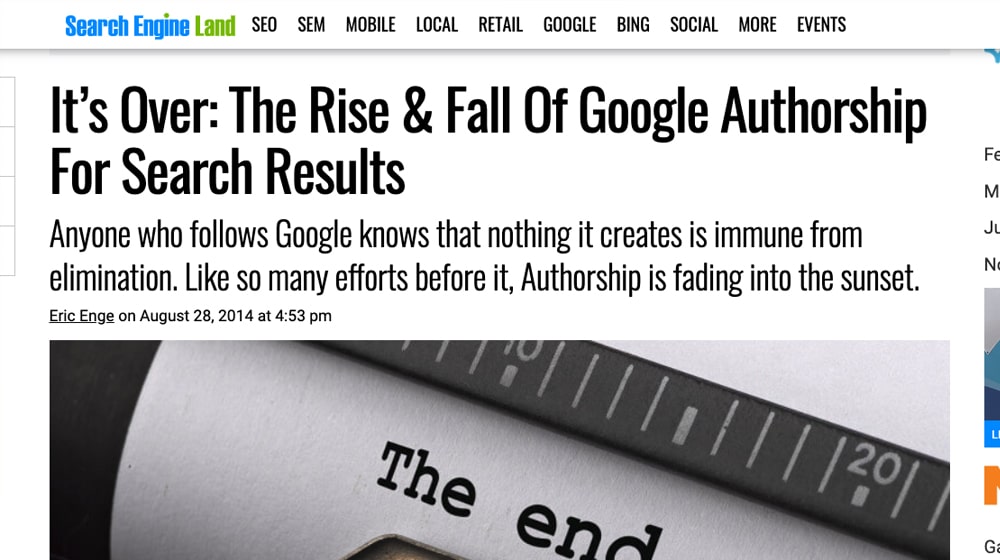
Blogging is a marketing strategy with no theoretical ceiling for how effective it can be. As long as you have fewer than every person on the planet reading your blog, you can still grow. Even the biggest sites on the internet still have just a fraction of the audience and the attention of the world's population.
It's no wonder, then, that a majority of marketers surveyed near the end of 2019 said they plan to increase their blogging efforts in the coming year. Some of those marketers are practiced old hands, with a great blogging routine they want to boost or invest more into. Some of them are newcomers to the scene, looking to build and expand on what they've heard is a great strategy. And, you know, of the 35% who don't plan to increase their blogging, plenty of them are already doing pretty much everything they can and don't have easy room to expand.
Fact #9: 53% of traffic is organic, and only 15% from paid ads.
Where does all your blog traffic come from? You can see your distributions in Google Analytics, of course, but if you're a newcomer to the blogging world, you might wonder where the statistics point.
53%, just slightly over half, of all traffic comes from organic web searches. That's people just using Google to look for something, and clicking a non-ad result to answer their question. As much as Google might like that number to be lower in favor of their paid ads, it's still true. The organic search model delivers the majority of the traffic each website experiences, on average. That's organic traffic in general, by the way, not just Google traffic.
15% of web traffic comes from paid advertising. This includes search advertising like Google, but it also includes YouTube ads, paid display ads on other sites, and ads on social networks.
The remaining 32% of traffic is broken up between other forms of traffic. This includes direct referrals, untracked traffic, traffic coming from offline sources, and so on. That's still a sizable amount of traffic, of course.
Fact #10: Over 25% of all websites have a blog.
Just how common are blogs, anyway? Well, recent studies suggest that over a quarter of all websites have a blog attached to them.
Some of the sites that don't are obvious, when you think about it. For example, a site like Disney's doesn't have a blog attached to it. Well, why not? They have other sites to cover their news, their announcements, and their business-building.

Then you have entire categories of sites that don't need to have blogs because they're a different kind of content entirely. Instagram doesn't have a blog because they're just part of Facebook. Reddit doesn't have a blog on their main site, because it's split off on another site. Web forums don't have blogs because they're nothing but content on their own.
Other sites have blogs even when you might not expect them to. Something like IMDB, which most people use as a source for information about movies, has a blog. As you might expect, they cover movie and media news. Other sites, like Facebook, use their platform to simulate a blog in their Newsroom and announcement sections. They don't need to blog regularly to grow.
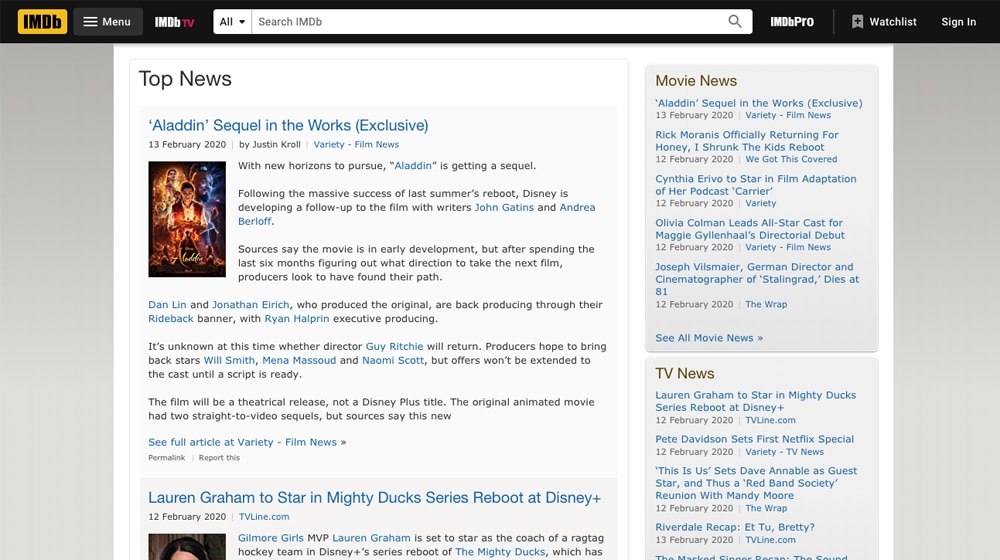
That number, by the way, is growing. A quarter of all websites have blogs, but more are creating blogs every day. The unending press of content is going to steadily increase as more and more businesses and website owners decide to blog.
Fact #11: Marketers who focus on blogging are 1,300% more likely to have a positive ROI.
Blogging increases trust and credibility, and it increases traffic to your site, but is that a good thing? If traffic is all you're getting, all you're doing is boosting your hosting bill with nothing to show for it. Luckily, you get more than just the traffic: you get money.
Businesses that run blogs have a dramatically higher chance of seeing a return on their investment than businesses that don't. Oh, sure, you can be profitable without a blog, and many businesses are. You can also fail in obscurity, such that no one ever notices you existed. A blog helps bring people in, where you can capture their attention and convince them they need whatever it is you sell.
Fact #12: Only 1/5th of business blog posts are over 750 words long.
I'm one of those marketers who believes longer content works better. I've tried it both ways; I used to write 1,000-word posts, and these days my posts range from 2,000 to 3,000 long. I'm on the upper end of what many marketers try, and I've seen increases in ROI and in ranking and traffic each time I bump up my goals.
Talking about publishing 70 million new posts every month makes it seem like it's impossible to stand out, and I'm not gonna lie; it's pretty difficult. However, when four out of five businesses is only publishing posts under 750 words, it's very easy to do what they do better than they're doing it. At that point, you might as well just use them as topic ideation. Take advantage of their legwork to give yourself a head start.
Fact #13: Longer blog posts generate 900% more leads than shorter posts.
You don't have to take my word for it. Longer content works.
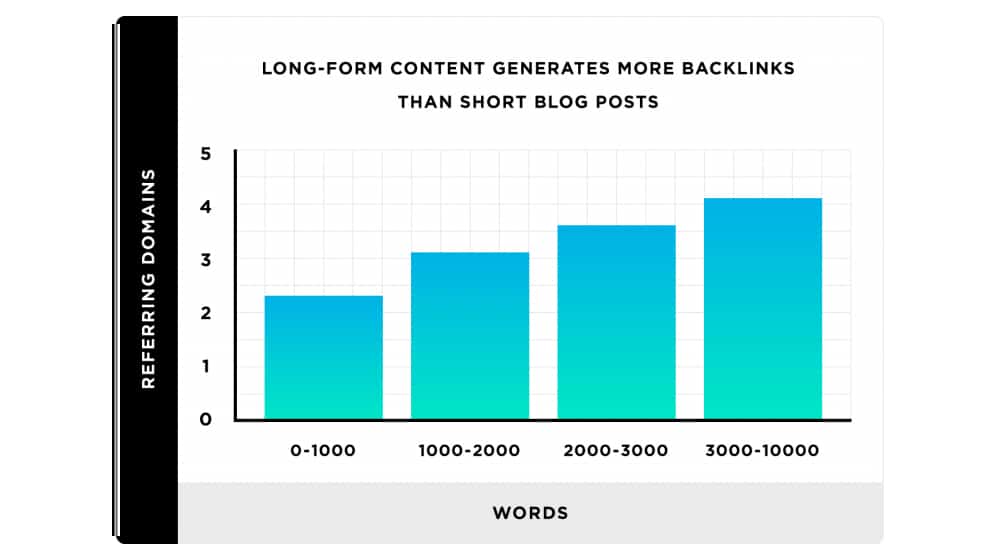
- Longer content gets more links.
- Longer content gets more traffic.
- Longer content out-performs shorter content on social media.
Longer content may be more difficult to write, but it's better to read, it's better to share, and it's better to get value out of, from the reader's point of view. Pleasing the reader is what blogging is all about, and statistics show that longer content is what readers want.
Fact #14: Sites with blogs have 434% more indexed pages than sites without.
Sounds obvious, right? The more pages you have on your site, the more pages you have indexed in Google's massive database of everything. It doesn't matter if your site has a million different product pages; Google will start to prune out a lot of the overlap, or at least rank it so low that it might as well not be indexed outside of a few really specific queries. Meanwhile, blog content routinely tops the search results for all but the most item-specific searches, and even then there's always some.
Fact #15: Blog posts with images get 94% more visitors than those without.
The internet is an increasingly visual form of media. Videos, images, animated gifs to split the difference; it's no longer enough to simply write. Writing content is just one part of an overarching content marketing plan.
Blog posts with images rank better, get more visitors, earn more links, and deliver better results. There's no two ways about it: you need to brush up on your Photoshop skills or start working with a graphic designer if you want your content to really do work for you.
What did you think of this infographic? Is there anything you'd add? What tips would you give to somebody who is thinking of blogging? Let us know in the comments below!



 30 Second Summary
30 Second Summary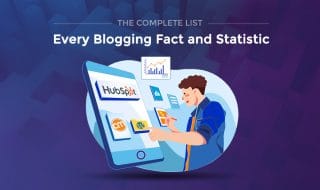



February 17, 2020
Wow! Very interesting points, as well as a powerful and updated post. I appreciate #14 most of all.
February 18, 2020
Thanks Jon! It sounds like common sense stuff (more content = more pages on Google) but visualizing that definitely puts it into perspective.
February 19, 2020
Impressive as always, James. Do you mind if I include this in a new post on my site? Would love to share this with my readers.
February 19, 2020
Hi Cheryl, thanks for your kind words! Of course, you can share it 🙂
March 02, 2020
Holy smokes.
Had no idea blogging (and WordPress for that matter) was so prevalant.
I guess it's time I start a blog, huh?
😉
March 03, 2020
Absolutely! You will thank yourself for it later. As long as you write helpful and carefully-crafted blog posts, and maintain some sort of long-term consistency in your publishing schedule, it's pretty hard to go wrong. Most people quit before they see any sort of results, so my advice is to keep at it and focus on quality over quantity. If you ever need pointers or assistance drop me a line!
August 19, 2020
I have created 23 blog entries for my small business. I just started like 3 months ago. I usually get excited to check my analytics but it’s not going well which is not helpful. When do you usually see better results? Or am I blogging really slow?
August 19, 2020
Hey Kate!
We wrote a great article on this subject here:
https://www.contentpowered.com/blog/blog-start-getting-traffic/
It can take years for a blog to start getting any sort of real traffic. This is heavily dependant on your blogging quality and that you're writing about the right things. You need to consider the potential traffic, competition, and interest of each topic. Read everybody that is ranking for that topic before writing - if they are all household names and they knocked it out of the park, it will be hard to compete. If you spot a gap where there isn't much good information on a topic, write a great article about it and enjoy the rewards. This is a good way to start out when your site is still new and small, as it's easier to rank for those topics.
Good luck!
October 12, 2020
Certainly agree with this! I think the percentage of readers increased since the pandemic. There are still countries/cities that are on quarantine and of course, rely on blogs for information.
February 09, 2021
Impressive infographic. Thanks for creating this.
February 11, 2021
Thanks Charlotte! Appreciate it, glad it was useful to you.